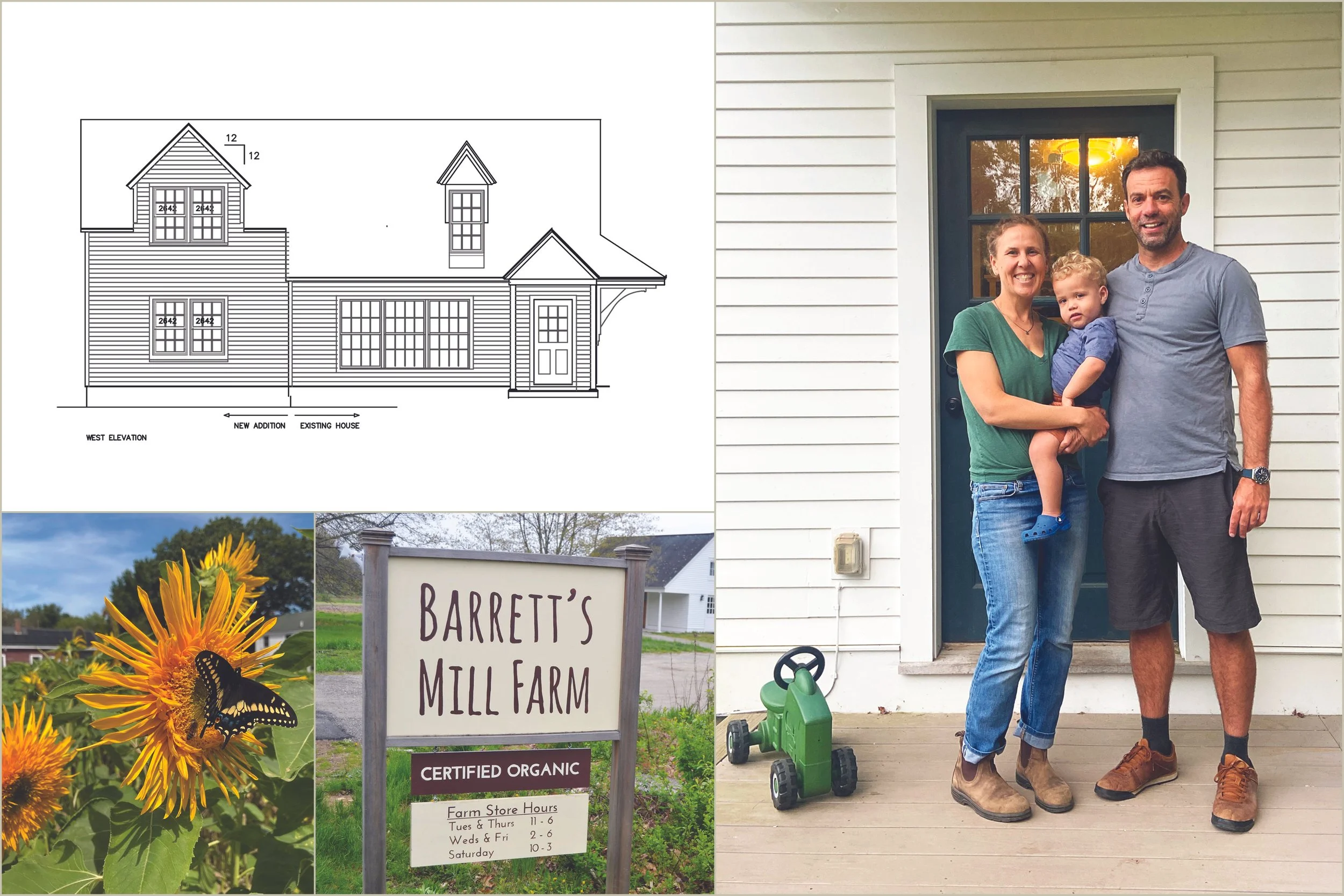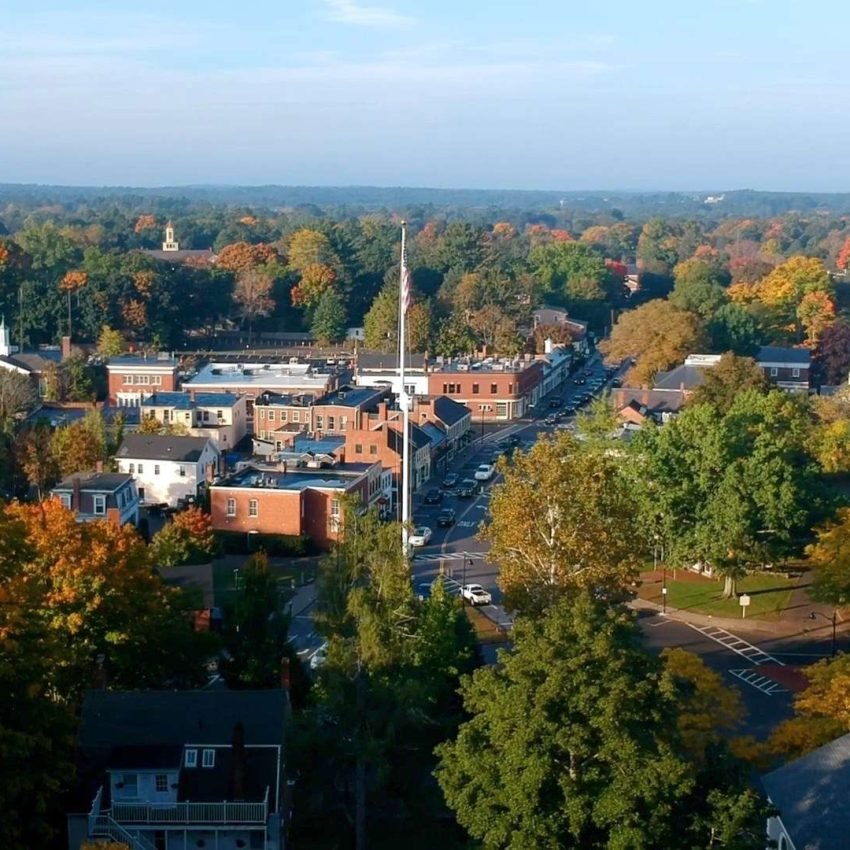Thank You For Helping CHF Reach Our Fundraising Goal to Renovate the Barretts Mill Farmhouse!
Thanks to generous donations from supporters of the Concord Housing Foundation and Barretts Mill Farm, we have reached our target of $330,000 in dedicated gifts for the farmhouse addition. Special thanks to The Stone Soup Foundation which supports agriculture in Concord, for their significant gift.
Looking ahead: Architectural plans are ready, and the Foundation is filing for Historic District Commission approval. In planning to expand the septic system for the addition, we learned that the existing system is failing, and have commissioned the design of a new system. When permits have been issued, we are ready to seek bids from contractors, and hope to begin construction on the addition this spring.
Visit our What We’ve Done page for more project info and updates.
Updated: 1/15/26
Town Meeting: Small Steps for Affordable Housing
Although there were no headline housing articles, Town meeting approved several warrant articles that can help increase the supply of affordable housing units.
Funds for the Municipal Affordable Housing Trust (CMAHT)
The Community Preservation Committee (CPC) recommended $500,000 in new funds for the CMAHT (our housing bank), as well as reallocation of $240,000 originally designated to build a small house at the edge of Gerow Park. That home was subsequently built by Habitat without the need for these monies. The CPC recommendations passed without significant opposition. This gives CMAHT a balance of about $3,000,00 to invest in affordable housing. With small units costing $500,000 or more to build, CMAHT is looking for creative ways to leverage this money to generate more affordable units. The CPC article also approved $43,500for the Regional Housing Services Office (RHSO), which provides staff and technical support to CMAHT and the Concord Housing Development Corporation (CHDC).
Encouraging Workforce Housing Units in Planned Residential Developments (PRDs).
Article 45 was proposed by the Concord Housing Foundation and written by Board member Matt Johnson. It amends the technical rules governing the number of affordable units required for a developer to obtain increased density under the PRD by law. Few PRDs have been built in recent years, in part because the required cross subsidy from market rate to affordable units is too large to make the development financially viable. This amendment allows units for somewhat higher income households (workforce housing) to decrease the required cross subsidy. CHF hopes this will encourage PRD construction, generating new smaller units that can be purchased – without public subsidy – by young professionals or skilled workers.
Funds from Newbury Court.
With the zoning change approved at Town Meeting, Concord’s leading retirement complex will now be able to build ~190 new units on the land across ORNAC purchased from Emerson Hospital. As a condition for Select Board support, Newbury Court signed a development agreement which puts some physical limits on building size and placement. The agreement also provides for Newbury Court to pay the Town (over time) $20,000 for each new unit. The funds must be used for “health care, financial assistance or housing for persons over 55.” The Foundation supported the article with the caveat that these funds be used for affordable elder housing. The Select Board is scheduled to discuss this request at its June 30 meeting. If the funds are reserved for elder housing, Concord may gain new units for higher-income elders at Newbury Court as well as subsidies to house elders with lower incomes.
Accessory Dwelling Units (ADU’s)
Technical amendments to Concord’s Zoning By Laws conformed the Town’s ADU by law with State legislation, passed last year. These units (free standing, or in the principal structure) may now be up to 1,000 square feet. Neither the principal residence nor the ADU must be occupied by the owner of the property, a change from Concord’s original ADU by law. This is not a subdivision of the property – the two units remain part of a single parcel. With the elder population in Concord increasing, these small units could provide affordable homes for singles or couples, who could also be involved in the care of the primary elder resident.
Town Acquires Peabody School Site
Town Meeting approved transfer of this property from the School Board. The land will be included in the multi-site planning process currently underway. The site could potentially accommodate a PRD. CHF will monitor discussions about the use of this and other sites becoming available – 2229 Main Street, MCI, and perhaps Ripley School.
Funds to Continue Planning for the Reuse of MCI
The money provided by the State for preliminary planning of the use of MCI expires at the end of June. Article 33 approved $250,000 of Town funds to continue the planning process. The MCI site abuts the Junction Village property already owned by CHDC and restricted for affordable housing. The Foundation will continue to engage in the planning process, seeking an extensive commitment to housing, and pressing for prompt development of the parts of the MCI site committed to housing.
Added: 6/18/25
One “40B” Project Approved, One Pending
In May 2023, recalculation of the Subsidized Housing Index (based on 2020 Census results) showed that Concord fell below the threshold of 10% affordable units. Almost immediately, developers filed a proposal with Mass Housing (the responsible State agency) for a multifamily project at 320 Baker Avenue, to be called NOVO Riverside Commons. This is a “40B development,” which would be built under a section of State housing law permitting developers to override local zoning if a municipality falls below the 10% affordable housing threshold.
The site is on the edge of the large Baker Avenue office complex, abutting a small pond and the railroad tracks. The site is an appropriate one for multi-family housing, within walking distance of the West Concord train station once a bridge is built across the Assabet River. The Riverside Commons project would provide 51 affordable units and respond to Concord’s climate goals by being “all electric.” Creation of the affordable housing units would be a major step forward in Concord’s Housing Production Plan.
The other units would be market rate, but within reach of many households who cannot afford to buy a home in Concord. In April 2024, the Zoning Board of Appeals issued a comprehensive permit for the project, which, at the time, was added to the Town’s subsidized housing inventory, taking the percentage of affordable units over 12%. The developer hoped to begin construction late in the first quarter or early in the seconds quarter of 2025 but financial and economic uncertainties are delaying the 201-unit project. In recent months NOVO Riverside Commons project slipped off the Town’s Subsidized Housing Inventory. (SHI), which happens if a 40B project does not file a building permit within one year of receiving ZBA approval. Owner Taurus Development is still hoping to begin construction this year and when the building permit is issued, the units in the project will again count on the SHI.
**********************************************************
A second 40B application was filed in the fall of 2023 for the current site of Camp Thoreau, off Forest Ridge Road. After reviewing the site and proposal, the Foundation recommended that the project not receive State support. The location puts a large number of additional homes close to the largest existing multi family housing project in town (The Prescott) and over two miles from West Concord center—-clearly contrary to the intent of transit-oriented development spurred by the MBTA zoning law. The development does not appear to be fossil fuel free, would require major alterations in land forms, and would create substantial additional traffic and vehicle pollution along Rte. 62. Based on comments by the Planning Board and Town staff, the Select Board submitted a similar recommendation to the State. However, the State allowed the project to proceed in December. The developer has responded to concerns about septic, drainage and placement of the entrance road, but is also proposing an increase in the number of units in the complex. On April 3, 2025 the Zoning Board of Appeals issued a special permit for a 237-unit project. The project will have 60 rental units affordable at 80% of Area Median Income (AMI).
Please read the CHF Newsletter for updates.
Updated: 6/25/25
Five Year Housing Production Plan Accepted by Select Board
Every five years, Concord and other Massachusetts municipalities must produce a document called a Housing Production Plan (HPP). The last HPP was developed in 2015, and the new plan has been delayed by COVID. It contains a detailed analysis of Concord’s demography, housing inventory and housing market. The new report submitted for Select Board review on December 19 can be found HERE.
No surprise, the report shows that the number of units in the official Subsidized Housing Inventory (SHI) has been effectively static for the last decade, while Concord housing prices grow further out of reach, even for current residents. To buy a single family home at the median price in 2020 would require (using standard criteria) a household income of $283,000. In an interesting analysis, the report finds that many “new” homes in Concord were tear downs. In the process, homes with an average of 1,473 square feet selling for $591,000 were replaced by homes averaging 3,917 square feet and selling for $1,460,000.
Because of delays in issuing the 2020 Census results, the report does not contain an updated calculation of the SHI. But with a recent small decline in the number of SHI units while permits were issued for 205 new housing units, Concord will almost certainly fall below the 10% SHI threshold used to determine the applicability of Section 40B. This shortfall would permit developers to override some zoning rules with dense new developments so long as the project contains enough affordable units.
The way forward is difficult. With the death of Junction Village, two single family units and the five homes at Assabet Bluff are the only units now in the pipeline. A new project at the Junction Village site, and a small number of units on existing Concord Housing Authority land are at least several years in the future.
The HPP looks beyond subsidized housing to consider how homes could become generally more affordable in Concord. Suggestions include:
Allowing duplexes “as of right” in all residential zones
Revisiting regulations (including the Thoreau Depot District) to encourage more housing in multiple use districts
Considering smaller lot sizes and increasing sewer capacity
The HPP is comprehensive in considering environmental protection, climate change, and making Concord a more inclusive community. The report lays out a complex web of options for the community. Now it is up to Concord citizens, the Planning Board, and the Select Board to choose and implement options which will reverse trends that price still more citizens out of Concord.
Added to website: December 2022
Concord Housing Foundation is a a non-profit 501c3 corporation dedicated to community outreach, education, and fundraising for affordable housing.
Help us by making a donation using the button below.




